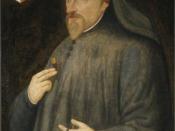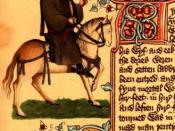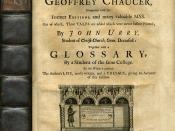The Knight and the Squire: Parenthood gone Medieval
Although the term "Like father, like son" has become a cliché from overuse, there is an undeniable truth at the heart of those four familiar words. A father's strengths and weaknesses are often reflected in the personality of his male offspring, and by analyzing one member of this unique relationship, it becomes possible to dissect the personality of the other. Due in part to these unique complexities, the dynamics of a father-son relationship has proved to be the cornerstone of many great literary works. One piece of literature that proves father-son relationships were not so different in the middle ages is Geoffrey Chaucer's epic poem The Canterbury Tales. In his classic work, Chaucer creates caricatures of many "sacred" figures of medieval culture, whom he lampoons using a sarcasm ahead of his time. Among the characters Chaucer satirizes, is a Knight and his son a Squire, both of whom Chaucer showers with praises deserving of a god.
Through Chaucer's brilliant use of double edged praise, it becomes apparent that the Knight and his son, the Squire are both men whose images are nothing more than a symptom of there shared weaknesses of pride and vanity.
As the character of the knight is first introduced, it becomes clear that he is a man who cherishes his noble image, and will stop at nothing to uphold it. "To ridden out, he loved chivalrye, truth and honour, freedom and curteisye" (Line 45-46). Through these lines Chaucer suggests that the Knight's main goal in life is to be perceived as the perfect specimen of nobility, and to reap the rewards which this perception brings, as he is "Evere honored for his worthiness" (Line 50).
In the following lines an enormous list of battles is cited all...


